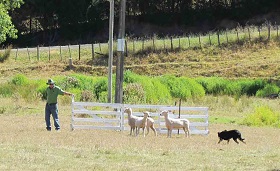Dog tapeworm cysts in sheep carcases
Three tapeworms spread by dogs to your sheep produce cysts in the carcase that can lead to partial or complete condemnation:
- hydatids
- sheep measles
- bladder worm.
Between them, they cause trimming losses in nearly 15 per cent of sheep slaughtered in Victoria.
Mutton abattoirs report losses of between $1000 and $2000 daily due to trimming of infected carcases. Individual producers have lost up to $4000 from heavily infected lines (2012 prices). Nearly half of lines of sheep inspected in Victoria are reported to have sheep measles.

The common feature of all of these tapeworms is the role of dogs in the spread of disease, including:
- farm dogs
- wild dogs
- dogs belonging to visitors and contractors.
Dogs pass tapeworm segments in their droppings onto pastures, where the eggs in the segments are eaten by grazing sheep.
In sheep, the eggs develop into larval cysts, which are seen at slaughter in a large number of carcases in internal organs such as the:
- gut
- heart
- diaphragm.
Sheep carcases on farms provide the source of reinfection of dogs when they eat the cysts in the carcases. Because of this, offal should not be fed to dogs—even cooking and freezing sheep meat fed to dogs does not guarantee killing of any cysts that are present.
Hydatids also pose a severe human health risk. Like sheep, humans are an intermediate host of the parasite, where the cysts develop. Humans are considered a 'dead-end' host of the parasite. People get infected when dogs lick their faces and hands, after licking themselves. The cysts can cause clinical disease in people (especially if present in the brain), which needs to be treated by surgical removal. The difficulty for surgeons is removing the cysts without rupturing them, which will seed the development of more cysts.
A recent survey by Dr David Jenkins from Charles Sturt University for Meat & Livestock Australia found that:
- 2 per cent of farm dogs had tapeworm eggs in their droppings
- 2 per cent of mainland farm dogs had DNA evidence of being infected with hydatids.
Reports of hydatids in sheep are uncommon. However, reports of any of these tapeworms (hydatids, sheep measles or bladder worm) in the lines of sheep you sell is a warning signal that tapeworm control in the dogs on and visiting your property is not up to scratch.
It is imperative to prevent dog reinfection and protect the health of you, your family and your staff.
How to break the dog–sheep tapeworm cycle
- All dogs on and entering your property must be treated with praziquantel tapewormer tablets every month. Specifically, for any dogs entering your property, this treatment must have been given between 3 and 30 days before their arrival.
- Feed dry or commercial dog foods, not sheep meat or offal. Cooking or freezing does not guarantee that the tapeworm cysts are no longer infective.
- Burn or bury carcases to prevent scavenging by your dogs and any stray or wild dogs in the neighbourhood.
- Lock your dogs up when they are not working so that they cannot scavenge carcases. Housing in runs where they are not exposed to their faeces (elevated runs, or hosed-out concrete floored runs) reduces the chance of human exposure.
Where a high prevalence of infection is reported, it is probable that wild dogs are involved, in a hydatid life cycle that also includes marsupials. The range of wild dogs changes over time, so when they come into an area where the sheep have low immunity (low levels of previous exposure) to hydatids, heavy infections can be found several years later. Similar 'storms' of sheep measles are seen about once a year in monitoring by the National Sheep Health Monitoring Project in Victoria. These are often where contractors' dogs have visited farms and infected an area that is intensively grazed, such as near the shearing shed or an irrigation bay.
Remember, 2 per cent of farm dogs have these tapeworms and many more farms have sheep measles.
Dog tapeworms found in sheep carcases at abattoirs from lines inspected by National Sheep Health Monitoring Program (NSHMP) inspectors are reported to you under funding from the Sheep and Goat Compensation Fund. Recent results of these inspections are available through Livestock Data Link.
Animal Health Australia has produced a snapshot report of the 2016 NSHMP results.
The report notes that the high-cost conditions are:
- grass seeds
- arthritis
- cheesy gland
- liver fluke
- sarcocystis
- pleurisy.